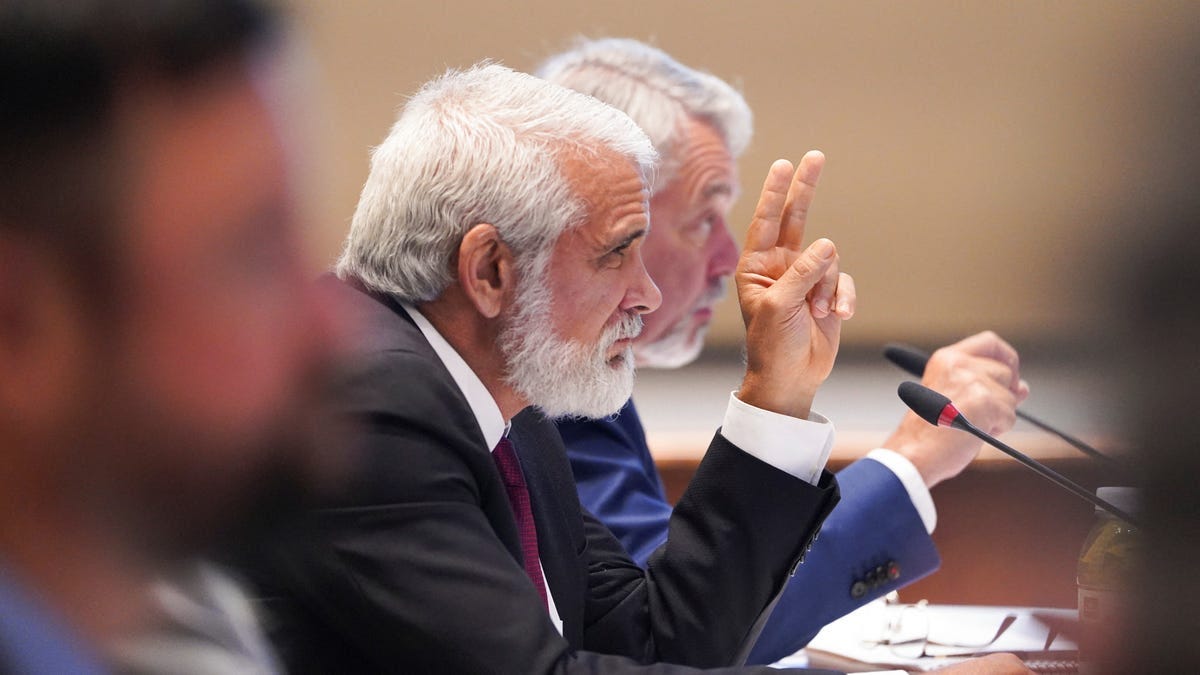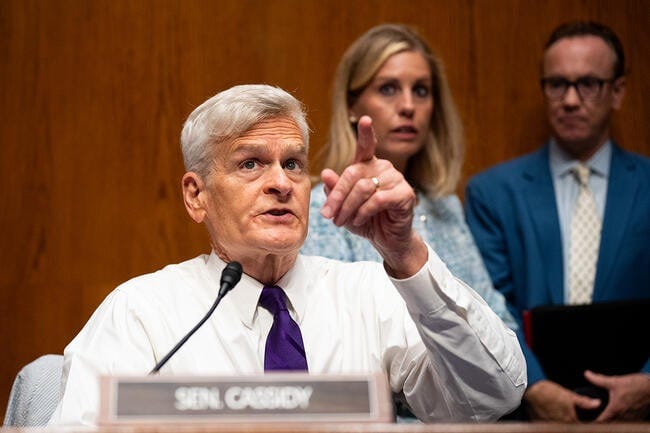Supreme Court hands Trump major win, limits judges’ ability to block birthright citizenship order nationwide
“The Supreme Court has handed the Trump administration a major victory by narrowing nationwide injunctions that blocked his executive order purporting to end the right to birthright citizenship.
In doing so, the court ended the power of individual district court judges to issue injunctions blocking federal government policies nationwide.
The justices, in a 6-3 vote along ideological lines, said judges can only grant relief to the parties who brought a particular lawsuit and may not extend those decisions to protect other individuals without going through the process of converting a suit into a class action.
‘When a court concludes that the Executive Branch has acted unlawfully, the answer is not for the court to exceed its power, too,’ Justice Amy Coney Barrett wrote for the court’s conservative majority. ‘The Court today puts an end to the ‘increasingly common’ practice of federal courts issuing universal injunctions.’
The ruling Friday came in connection with three lawsuits where judges granted nationwide injunctions against an executive order President Donald Trump signed on the first day of his second term, seeking to deny American citizenship to children born in the U.S. to foreigners on short term visas and those without legal status.
The court did not rule on the legality of Trump’s order purporting to end birthright citizenship, although the three liberal justices said the president’s directive was clearly unlawful.”
Read the latest at POLITICO
Supreme Court upholds Affordable Care Act’s preventive-care mandate
“The justices ruled against a Christian-owned business and individuals who objected to being forced to offer medications intended to prevent the spread of HIV among at-risk populations. The challengers argued that the panel that determined what care must be covered was improperly appointed.”
Read more at Washington Post
Supreme Court clears way for states to kick Planned Parenthood out of Medicaid
“The Supreme Court on Thursday cleared the way for states to exclude Planned Parenthood from their Medicaid programs.
In a 6-3 decision divided along ideological lines, the court’s majority concluded that federal law doesn’t allow Medicaid patients to bring lawsuits alleging that their state has abridged their right to visit their preferred medical provider under the health insurance program for low-income Americans.
The decision rejected a challenge to South Carolina’s expulsion of Planned Parenthood from its Medicaid program. It will likely allow other conservative states to similarly expel reproductive and sexual health clinics from their Medicaid programs — shrinking the already narrow network of providers available to low-income patients.
‘Defunding’ Planned Parenthood is a goal of many conservatives, who object to its abortion services. Federal law has long banned federal money from being used for abortions. But Planned Parenthood clinics provide many other health care services that are typically eligible for payment under Medicaid.
Thursday’s ruling will make it easier for states to deprive Planned Parenthood — and other clinics that provide abortions — from receiving Medicaid payments for any of their other non-abortion-related care.
The court’s conservative majority ruled that while federal law guarantees Medicaid beneficiaries the right to see any ‘qualified and willing’ provider, the statute doesn’t grant patients legal standing to sue if a state denies access to certain providers.”
Read the latest at POLITICO
Key Medicaid provision in Trump's bill is found to violate Senate rules. The GOP is scrambling
“The Senate parliamentarian has advised that a Medicaid provider tax overhaul central to President Donald Trump's tax cut and spending bill does not adhere to the chamber's procedural rules, delivering a crucial blow as Republicans rush to finish the package this week.” Read More at AP News
Justice Department says Kilmar Abrego Garcia will face US trial before any move to deport him again
This courtroom sketch depicts Kilmar Abrego Garcia sitting in court during his detention hearing on Wednesday in Nashville, Tenn. (Diego Fishburn via AP)
“The Justice Department said Thursday that it intends to try Kilmar Abrego Garcia on federal smuggling charges in Tennessee before it moves to deport him, addressing fears that he could be expelled again from the U.S. within days. Read more.
Why this matters:
Concerns have grown that Abrego Garcia would be swiftly deported upon his release from jail in Tennessee. During the court hearing Wednesday, U.S. Magistrate Judge Barbara Holmes set specific conditions for Abrego Garcia’s release that included him living with his brother, a U.S. citizen, in Maryland. But she held off on releasing him over these concerns.
Justice Department attorney Jonathan Guynn acknowledged during a conference call Thursday afternoon that the U.S. government plans to deport Abrego Garcia to a “third country” that isn’t El Salvador. But he said there was no timeline for the deportation plans.” [AP News]
Defense Secretary Pete Hegseth speaks at a news conference with Joint Chiefs Chairman Gen. Dan Caine at the Pentagon on Thursday. Kevin Wolf/AP
US-Iran
“The Pentagon released new details about the US attack on Iran’s nuclear facilities last weekend, including how the military prepared for the mission, the crews who carried out the raid and how Iran tried to fortify one of the sites in advance of the bombing. However, Thursday’s briefing did not provide new intelligence supporting President Donald Trump’s assertion that the strikes ‘obliterated’ Iran’s nuclear program. Both Joint Chiefs of Staff Chairman Gen. Dan Caine and Defense Secretary Pete Hegseth referred questions about that to the intelligence agencies. Until all of the intel is gathered, the full extent of damage at the facilities remains unclear.” [CNN]
Trump threatens CNN
“A lawyer representing President Trump has sent letters to CNN and The New York Times threatening legal action over their reporting on the US attack on Iran. Attorney Alejandro Brito alleged that the stories published on June 24 describing an early US intelligence assessment of the strikes were false and defamatory. Both media outlets rejected that claim. Trump has insisted that Iran’s nuclear enrichment sites were ‘completely and totally obliterated,’ but the preliminary assessment from the Pentagon’s intelligence arm suggested the bombings did not destroy the core components of Iran’s nuclear program. Administration officials confirmed the existence of the intel and Trump said that anyone who leaked it to the press ‘should be prosecuted.’ The president also described both media outlets as “fake news” and called for one of the three CNN reporters who broke the story to be fired. CNN replied: ‘We stand 100% behind Natasha Bertrand’s journalism and specifically her and her colleagues’ reporting’ about the assessment.” [CNN]
OUR IRAN REPORTING
Secretary of Defense Pete Hegseth speaking on Wednesday. Haiyun Jiang/The New York Times
“On Wednesday, President Trump threatened to sue The Times. He demanded an apology and a retraction for our coverage of an initial U.S. intelligence assessment saying the airstrikes against Iran had set back its nuclear program by just months. Defense Secretary Pete Hegseth then gave a news conference yesterday lamenting what he described as The Times’s failure to report on the attack’s impact. Patrick Healy, who oversees Times newsroom standards, addresses those critiques.
There are two problems here. First, the government keeps contradicting itself: Trump and Hegseth say the nuclear program was ‘obliterated,’ but then they and Secretary of State Marco Rubio keep making statements that undermine their mission-accomplished narrative. Second, we published stories on topics Hegseth said we had ignored:
Spy agencies are still refining the intelligence on Iran. We reported that here.
The strikes on the Fordo complex destroyed key infrastructure. We reported that here.
Expert analysts said U.S. and Israeli strikes had caused enormous damage to Iran’s nuclear sites. We reported that here.
Israel’s military said its strikes had set back Iran’s nuclear program by years. We reported that here.
Assessments by the C.I.A. director and the director of national intelligence said that the strikes had severely damaged Iran’s nuclear program. We reported on them here.
Hegseth also asked aloud yesterday, ‘How many stories have been written about how hard it is to fly a plane for 36 hours?’ Read Greg Jaffe’s great story on the subject.
As for Trump’s threats, The Times’s deputy general counsel, David McCraw, replied to the president’s lawyers on Thursday by quoting Trump’s shifting statements and explaining what it is we do. ‘No retraction is needed. No apology will be forthcoming,’ McCraw wrote. ‘We told the truth to the best of our ability. We will continue to do so.’
More on Iran
Centrifuges at Iran’s Fordo enrichment plant are ‘no longer operational,’ the head of the U.N.’s nuclear watchdog said.
Iran’s supreme leader, Ayatollah Ali Khamenei, made his first public comments since the U.S. attack. He played down damage to his country’s nuclear program.
Iran’s foreign minister, however, said the nuclear facilities had sustained ‘significant and serious damages.’” [New York Times]
DOGE enters ATF with mandate to slash gun regulations as Trump administration pushes to drastically reduce number of inspectors
“The U.S. DOGE Service is working with the Bureau of Alcohol, Tobacco, Firearms and Explosives general counsel to cut more than 50 regulations. Gun-control advocates fear the changes will more easily allow potentially dangerous people to obtain weapons with little recourse.”
Read more at Washington Post
Mapped: Where same-sex marriage would vanish
Data: Movement Advancement Project. Map: Jacque Schrag/Axios
“More than two dozen U.S. states have trigger laws that would limit marriage equality if the Supreme Court overturned its legalization of gay marriage, Axios' April Rubin writes.
Why it matters: Today is the 10th anniversary of Obergefell v. Hodges. Access to marriage equality faces increasing opposition.
By the numbers: 32 states have constitutional and/or legislative bans on marriage equality, currently unenforceable because of the 2015 Supreme Court ruling.
So about 60% of LGBTQ+ adults live in states where access to marriage equality would change if Obergefell were struck down, according to the Movement Advancement Project.” [Axios]
New York Mayor’s race
“Mayor Eric Adams, who is running for re-election as an independent, met with New York City business leaders desperate to stop Zohran Mamdani, the likely Democratic nominee.” [New York Times]
“National Republican figures are attacking Mamdani with Islamophobic tropes, linking him to the 9/11 attacks and calling for his deportation.” [New York Times]
INTERNATIONAL
“Donald Trump has long scorned Africa. Now he sees it as another potential route to a Nobel Prize.
US Secretary of State Marco Rubio will today host the signing of a peace accord between Rwanda and the Democratic Republic of Congo, which have been fighting over a particularly valuable patch of the continent for three decades.
Rebel group in Goma, eastern Congo, in January. Photographer: Getty Images
Congo accuses Rwanda of backing a rebel group that’s taken over huge swaths of its mineral-rich east.
Rwanda says Congo’s government can’t secure its own territory and is harboring rebels linked to the Hutu perpetrators of the 1994 Rwandan genocide, in which more than 800,000 Tutsis and moderate Hutus died.
The conflict’s current iteration has contributed to one of the world’s worst humanitarian disasters, with around 6 million Congolese displaced from their homes.
A peace deal would be ‘a Great Day for Africa and, quite frankly, a Great Day for the World!’ Trump posted last week.
His administration is promising investment if Rwanda backs off.
Eastern Congo has gold, tin and tantalum, which is used in portable electronics. South of the conflict zone are some of the planet’s richest copper, cobalt and lithium deposits, and Congo wants to diversify away from the Chinese miners who dominate the industry.
That’s music to the ears of a US president who demanded a minerals deal with Ukraine and openly covets Greenland’s resources.
Yet the fighting persists for a reason, with knotty questions over land and ethnicity that will take years of attention to address.
Trump seems to think the Nobel committee should take notice regardless.
‘I won’t get a Nobel Peace Prize for this,’ he posted ruefully, putting the Rwanda-Congo war alongside a list of others he has dabbled in, from Russia’s invasion of Ukraine to India-Pakistan and the Iran-Israel clash that’s witnessing a fragile ceasefire.
So many conflicts, all unresolved.” — Michael J. Kavanagh [Bloomberg]
M23 rebel-group members stand guard at the Goma crossing into Congo in March. Photographer: Jospin Mwisha/AFP/Getty Images
“China confirmed details of a trade framework with the US, echoing US Commerce Secretary Howard Lutnick’s comments about an agreement. The pact codifies the terms laid out in previous talks, including a commitment from Beijing to deliver rare earths used in everything from wind turbines to jet planes. The White House also has imminent plans to reach accords with 10 major trading partners, Lutnick said.” [Bloomberg]
“Iran denied that nuclear talks with the US are scheduled to resume, diminishing prospects for diplomacy after Trump suggested a deal could come as early as next week. US Defense Secretary Pete Hegseth berated the media at a Pentagon press briefing over reports that questioned the effectiveness of strikes on Iran’s nuclear program, without offering new information.” v
Photographs of Iranians allegedly killed since the Iranian Revolution are displayed at the “Free Iran” display on the National Mall in Washington on June 22. Photographer: Aaron Schwartz/Bloomberg
“Trump said a ‘very big’ trade deal could be signed soon with India that would open up the country’s market to US companies, as negotiators meet in Washington to try to resolve key sticking points. Talks have been stymied by a US demand that India open its economy to genetically modified crops — an ask the government in New Delhi has rejected, citing risks to its farmers.” [Bloomberg]
“Keir Starmer agreed to pare back a divisive £5 billion cut to welfare to quiet a rebellion by his own Labour Party, a decision that will likely leave both Britain’s fiscal plans and the prime minister’s leadership in need of repair. The climbdown should persuade enough of the more than 120 rebels to support the government and prevent Starmer from losing the vote, sources say.” [Bloomberg]
“South Korean President Lee Jae Myung began his term with a higher approval rating than recent predecessors, as hopes for an economic recovery rise after months of political turbulence. Despite the upbeat sentiment, Lee still needs to strike a deal with the Trump administration over trade tariffs to limit the impact on exports like chips and cars.” [Bloomberg]
“Mexico’s bank regulator stepped in to temporarily run three financial firms, an extraordinary measure aimed at protecting customers following money-laundering accusations by US authorities this week.” [Bloomberg]
Mexican soldiers on patrol due to the increase of violence in Zacatecas state in 2022. Photographer: Pedro Pardo/AFP/Getty Images
“Kosovo’s top court ordered lawmakers to complete the inaugural session of parliament within 30 days, pressing politicians to resolve a stalemate which has prevented the formation of a new government since February’s election.” [Bloomberg]
“The Treasury Department announced a deal with Group of Seven allies that will exclude US companies from some levies imposed by other countries in exchange for removing the Section 899 “revenge tax” proposal from Trump’s signature bill.” [Bloomberg]
“South African President Cyril Ramaphosa fired a deputy minister from the second-largest party in the ruling coalition, renewing strain on the stability of his administration.” [Bloomberg]
“Short of commanders, deprived of much of its tunnel network and unsure of support from its ally Iran, Hamas is battling to survive in Gaza in the face of rebellious local clans and relentless Israeli military pressure.” [Reuters]
BUSINESS AND ECONOMY
All three major U.S. stock indexes rose on Thursday.
PHOTO: MICHAEL M. SANTIAGO/GETTY IMAGES
The S&P 500 and the tech-laden Nasdaq Composite closed just below their all-time highs, extending a 180 from the stock-market rout in April.
“The S&P finished 0.8% higher, less than 0.1% shy of its high water mark, and the Nasdaq added 1% and notched its highest finish since Dec. 16. The Dow Jones Industrial Average climbed 0.9%. Tech stocks were hit hard during the market’s swoon but boomeranged ( read for free) as investors grew more optimistic about avoiding a trade war—and regained enthusiasm for companies involved in AI.” [Wall Street Journal]
Unemployment among young college graduates outpaces overall US joblessness rate
“Young people graduating from college this spring and summer are facing one of the toughest job markets in more than a decade. The unemployment rate for degree holders ages 22 to 27 has reached its highest level in a dozen years, excluding the coronavirus pandemic.” Read More at AP News
Kroger plans to close 60 US stores in 18 months to improve profits
“The Cincinnati, Ohio-based company hasn’t said which stores it plans to shutter, but said the closures will happen around the country. It also said employees at impacted stores will be offered jobs at other locations.” Read More at AP News
HEALTH AND MEDICINE
RFK Jr. appointees vote to effectively remove a flu shot preservative, advancing a priority of anti-vaccine activists
“The Advisory Committee on Immunization Practices — overhauled by Health and Human Services Secretary Robert F. Kennedy Jr. — voted Thursday to stop recommending flu shots containing the preservative thimerosal, which research has shown is safe. Most flu shots are thimerosal-free, but public health experts said the move could make shots more expensive and harder to receive. Many also expressed concern that anti-vaccine rhetoric is becoming official government guidance.”
Read more at Washington Post
In surprise move, RFK Jr.'s vaccine panel votes to recommend RSV shot
READ FULL STORY→ USA Today
MEDIA
Andri Tambunan for The New York Times
Newsom Sues Fox News for Saying He Lied About Call With Trump
“The lawsuit, which seeks at least $787 million in damages, comes as Gov. Gavin Newsom of California adopts an increasingly combative style with the president and his allies.”
Read more at New York Times
Vogue's Anna Wintour stepping down as editor-in-chief
“Anna Wintour is stepping down as editor-in-chief at Vogue after nearly four decades in the role.”
READ FULL STORY→ USA Today
Trump representative Kari Lake on Voice of America’s fate: ‘Scrap the whole thing and start over’

By DAVID BAUDER
“The Trump administration’s choice to oversee government-run news outlets like Voice of America told a congressional committee on Wednesday that ‘it’s best to just scrap the whole thing and start over.’
Kari Lake, the former Arizona newscaster turned Republican politician, testified that the U.S. Agency for Global Media is ‘rotten to the core’ and that any salvageable parts should be put under the control of the U.S. State Department.
Lake appeared before the House Foreign Affairs Committee days after layoff notices were sent to hundreds of employees at the agency and Voice of America, cutting its staff by 85%. With politicians speaking over and around each other, the hearing amounted to a debate on what role journalism should have in spreading American influence abroad.
Lake said she is following President Donald Trump’s directive to cut the dozens of outlets to the core, with most already shut down or sharply curtailed. She characterized many broadcasts as anti-American or promoting liberal bias, pointing to efforts by Chinese government representatives in the U.S. to influence Mandarin-language content on Radio Free Asia.
Trump backs up Lake via social media post
The agency is investigating threatening phone calls to a member of Congress from inside Voice of America, Lake said, hinting — but not saying outright — that the target was a Republican.
Trump backed her up via a Truth Social post on Wednesday: ‘Why would a Republican want Democrat ‘mouthpiece’ Voice of America (VOA) to continue? It’s a TOTAL, LEFTWING DISASTER — No Republican should vote for its survival. KILL IT!’
A congressionally-mandated firewall ‘makes it impossible for agency management to prevent biased, anti-American or rogue reporting,’ Lake said. The ‘firewall’ she refers to has been in place since 1994, prohibiting any interference by a U.S. government official in the independent reporting of news.
Separate from the hearing, VOA director Mike Abramowitz, who is out on administrative leave, said he’s aware of no rogue journalists spreading misinformation. Reporters who make mistakes are corrected, he said, and those who violate standards are disciplined.
Since Voice of America’s inception in World War II, the outlets have operated under the theory that objective news reports delivered to citizens whose own governments resist such freedoms is a ‘soft power’ way to promote the nation’s interests.
‘I feel like I am suffering through a propaganda war through your testimony,’ said U.S. Rep. Madeleine Dean, a Pennsylvania Democrat. ‘For those of you who think this is about reform, it’s not. It’s about shutting down media.’
Abramowitz, in a note sent to colleagues on Wednesday, said he was ‘saddened and angered’ that the motives and patriotism of VOA employees were questioned in the hearing..
Democrats pointed to reports about Russia and China stepping up their own media efforts to fill the void left by stilled American voices. ‘Reliable news is no longer accessible for millions of people around the world,’ said U.S. Rep. Gabe Amo, a Rhode Island Democrat. ‘If our adversaries are cheering this decision, why would we do that?’
Employees at Voice of America’s Persian-language branch that broadcasts in Iran, were hurriedly called back into work at the outset of the Israel-Iran war, only for most of them to be laid off less than a week later.
Democrats characterized that as a missed opportunity to speak to Iranian citizens at a time when their government was weak. But Lake said a few employees were able to translate Trump’s speech announcing the U.S. bombing on Saturday into Farsi for the radio outlet.
Jobs for freelance journalists?
‘We don’t need to have massive newsrooms,’ Lake said. U.S. Rep. Brian Mast, a Florida Republican, said that ‘a lot of journalists are freelance. That’s something we should look into.’
Some Democrats personally attacked Lake as unreliable, particularly a fellow Arizona resident, Rep. Greg Stanton, who pointed to false statements Lake had made about her own failed bids to get elected as governor and senator of that state.
‘The American people cannot believe a word you say,’ Stanton said. Lake said Stanton was spouting ‘complete insanity.’ ‘I wish I could yield back the last five minutes of my life,’ she said.
Meanwhile, several Republicans saluted Lake for trying to reform the agencies.
The outlets’ futures remain uncertain. There are a handful of court cases aimed at restoring funding and ordering a resumption of services. But the longer many remain off the air, the easier it is for followers to get into new habits of consuming news.” [AP News]
HIGHER EDUCATION
Senate Parliamentarian Nixes Workforce Pell From Megabill
The decision shocked some higher ed lobbyists but is a win for critics of the plan.
Sen. Bill Cassidy, the Louisiana Republican who chairs the Senate education panel, helped to draft the Senate’s proposed higher ed overhaul.
Bill Clark/CQ-Roll Call Inc./Getty Images
“A plan to expand the Pell Grant to students in short-term workforce programs was cut from a budgetary megabill early Thursday morning despite immense bipartisan support. It was one of several higher education–related provisions that a Senate official struck down.
Other provisions that violate Senate procedural rules included plans to consolidate student loan repayment options for current borrowers, limit grant access for noncitizens and exclude medical residents from a loan-forgiveness program. But the decision against expanding grants shocked some higher education experts who expected Congress to finally pass the proposal after years of trying.
‘It’s been abundantly clear for years now that many low-income students don’t have the finances to take advantage of the programs that would be made eligible by workforce Pell and therefore they don’t have the opportunity to benefit,’ said David Baime, senior vice president of government relations for the American Association of Community Colleges. ‘There has been such strong support that a successful challenge was not necessarily something that we anticipated.’
However, Sen. Tim Kaine, a Virginia Democrat who has long supported the concept known as workforce Pell, was less confounded.
‘At every turn, President Trump and congressional Republicans’ process for this partisan megabill has been mired by chaos and infighting,’ Kaine said in a statement to Inside Higher Ed. ‘It’s no surprise that many provisions are being removed and changed.’
It’s a win for critics of the provision, who argued it lacks critical guardrails and would lead to a spike in unaccredited, for-profit programs. But Baime is hopeful that the provision can be salvaged and reintroduced.
If reintroduced, the provision would have to undergo the same sniff test as the first workforce Pell. The test, known informally as the Byrd bath, is necessary because Republicans are using a special legislative process known as reconciliation to pass the bill.
Under reconciliation, the bill can pass the Senate with 51 votes instead of the normal 60. But lawmakers have to stick to the reconciliation rules. For instance, all of the policies in the bill must either generate a new form of revenue, cut costs or instill new government spending.
A nonpartisan Senate official, known as the parliamentarian, signs off on whether each provision adheres to the rules, though senators can overrule the official with 60 votes—unless senators can secure 60 votes to overrule the parliamentarian’s ruling, what he or she says goes.
The current parliamentarian, Elizabeth MacDonough, didn’t publicly explain her decision, which was released by Democrats on the Senate budget committee. MacDonough also rolled back key cuts to Medicaid, enraging many Republicans. Some are even calling for her to be fired.
‘Unelected bureaucrats think they know better than U.S. Congressmen who are elected BY THE PEOPLE,’ Sen. Tommy Tuberville of Alabama wrote Thursday on X. ‘Her job is not to push a woke agenda. THE SENATE PARLIAMENTARIAN SHOULD BE FIRED ASAP.’
As a whole, the legislation known as the One Big Beautiful Bill Act aims to fund President Donald Trump’s policy priorities, like extending tax cuts for the wealthy and cracking down on illegal immigration. But without the cost savings of multibillion-dollar cuts to Medicaid, Republicans face a major setback in balancing the budget.
Lawmakers also were counting on about $275 billion in savings from rolling back an income-driven repayment plan known as Saving on a Valuable Education, or SAVE, which the Biden administration put in place but the federal courts have blocked. Some higher education experts, including Preston Cooper, a policy analyst at the conservative think tank the American Enterprise Institute, believe the parliamentarian’s ruling on consolidating repayment plans bans the Senate from taking the final step to kill SAVE. If Cooper and others are right, that could cost the Senate even more.
Regardless, the Senate’s self-imposed deadline of July 4 to pass the bill now seems nearly impossible. But higher education experts are still keeping a close eye on the megabill, because if it does pass—even with the cuts that have been made—it could have serious consequences for colleges and universities.
One thing that did clear the parliamentarian’s review was the Senate’s plan to hold colleges accountable for students’ earnings. Much like the workforce Pell ruling, this was unexpected by many higher education policy experts. They say that now the odds of colleges facing new consequences for their students’ outcomes are higher than ever.
‘We have an accountability construct that is likely going to be in the Higher Education Act for the first time ever,’ said Emmanual Guillory, senior director of government relations at the American Council on Education. ‘The primary focus should be on what is actually remaining.’
The measure, which senators are calling the ‘No Harm Done Plan,’ would terminate federal loan access for any academic programs at the associate level or higher that fail to ensure its students earn more than they would without a degree. Programs that fail the test for two out of three consecutive years would be cut off from loans.
Meanwhile, the House plan would take an entirely different approach by putting colleges on the hook for unpaid student loans. Unlike the Senate, the House’s measure, known as risk-sharing, would affect the majority of colleges, using a complex formula to charge them an annual fee for their students’ unpaid loans.
Higher education lobbyists have shown much more support for the Senate’s plan, though they still want to see some changes.
And the bill still has a long way to go before becoming law. The parliamentarian hasn’t yet ruled on rolling back consumer protection regulations put in place by the Biden administration. Even if the legislation passes the Senate, House Republicans will likely make their own changes, which would require a second round of Byrd bath tests.
For example, if risk-sharing were to replace the do-no-harm provision, the parliamentarian would need to sign off. Knowing this, higher education lobbyists continue to make their case to lawmakers about why they should rethink the accountability measures.
‘There has to be a compromise between the House and the Senate on what will ultimately be signed by the president,’ Guillory said. So ‘we are still working with [House] committee staff in order to make them aware of the impacts of their proposal[s] with publicly available data that we have access to and trying to do the best we can to avoid any unintended consequences with the proposal. We are trying to make the outcome as best for students as possible.’ [Inside HigherEd]
“The administration has privately pushed for the University of Virginia’s president’s resignation as part of a Justice Department investigation into the school’s D.E.I. efforts.” [New York Times]
RELIGION
Majority of US adults support religious chaplains in public schools, a new AP-NORC poll shows
“Few U.S. adults support allowing religious schools to become tax-funded public charter schools, but a majority favors allowing religious chaplains to provide support services for public school students, a new poll finds. The survey shows the complexity of Americans’ attitudes toward religious expression in schools, which varies depending on the kind of expression and sometimes crosses partisan lines. Read more.
Why this matters:
About 6 in 10 U.S. adults say that religious chaplains should be allowed to provide support services for students in public schools, but most do not think teacher-led prayer or a mandatory period during school hours for private prayer should be allowed in public schools.
Americans are more likely to oppose allowing religious schools to become tax-funded public charter schools than to favor this. About 4 in 10 are opposed, while roughly one-quarter are in favor and about one-third are neither in favor nor opposed.” [AP News]
SPORTS
“Four minutes: Faith Kipyegon, the Kenyan Olympic champion, tried to become the first woman to break the four-minute mile — but she ran about six seconds too slow.” [New York Times]
“M.L.B.: Wander Franco, 24, a former Tampa Bay Rays All-Star, was given a two-year suspended sentence after being convicted of sexual abuse of a minor in the Dominican Republic.” [New York Times]
TRANSITIONS
Chad Batka for The New York Times
Bill Moyers, Presidential Aide and Veteran of Public TV, Dies at 91
“Before becoming known as an unusual breed of television correspondent and commentator, he had a long association with President Lyndon B. Johnson.”
Read more at New York Times
“Carolyn McCarthy, a former congresswoman from Long Island who became a champion of firearms regulation after a gunman on a commuter train shattered her family, died at 81.” [New York Times]



















